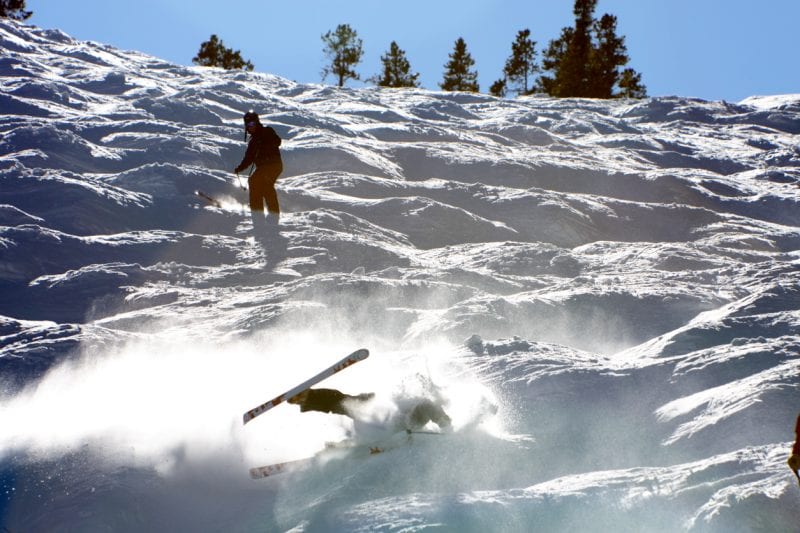At Complete Physio we are dedicated to keeping you out of pain and fully fit!
As winter sports enthusiasts gear up for thrilling adventures on the slopes, it’s essential to be aware of the potential risks associated with skiing, particularly when it comes to shoulder injuries. The dynamic nature of skiing, combined with the high-speed descents and unexpected falls, can result in some nasty shoulder injuries!
In this blog, we’ll explore some of the most common skiing shoulder injuries and discuss effective treatment strategies to ensure a safe and enjoyable skiing experience.
What are the most common shoulder injuries you’ll likely suffer?
The shoulder is one of the more commonly injured body parts in skiing (only second to the knee). No matter how good you are, whether a skier or a snowboarder there will always be a time when you fall… and it won’t always be your fault!
Shoulder Dislocations
A shoulder joint dislocation occurs when the ball-shaped head of the upper arm bone (humerus) pops out of its socket in the shoulder blade (glenoid).
The high-velocity falls and impact during skiing can lead to shoulder dislocations, where the humerus bone pops out of its socket. Immediate medical attention is crucial for reducing the dislocation and stabilising the shoulder.
AC Joint Injuries
An AC (acromioclavicular) joint injury involves damage to the joint at the top of the shoulder where the acromion (a bony projection of the shoulder blade) meets the clavicle (collarbone). The severity of an AC joint injury can range from mild sprains, involving stretched ligaments, to more severe cases involving ligament tears and joint dislocation.
Acromioclavicular (AC) joint sprains or complete separation often occurs when skiers land on an outstretched arm during a fall.
Fractures
Collisions with other skiers, trees, or hard surfaces can result in arm or shoulder fractures. The most common fractures are a broken humerus (upper arm) or a clavicle (collar bone) fracture.

Fractures may require immobilisation, and severe cases may need surgical intervention.
Rotator Cuff Tears
A rotator cuff tear is a shoulder injury that occurs when one or more of the tendons comprising the rotator cuff, a group of muscles and tendons that stabilise the shoulder joint, become damaged or torn.
Rotator cuff tears are a common concern for skiers, given the nature of the sport’s repetitive arm movements and the dynamic demands placed on the shoulders during descents.
The abrupt twists and turns inherent in skiing can strain the rotator cuff muscles, leading to inflammation and potential tears.
Skiers should be vigilant about doing a proper warm-up each morning, and should ideally do some strengthening exercises targeting the rotator cuff muscles before hitting the slopes!
If you think that you have suffered from any of the above injuries then book an appointment to see us asap.
Following your assessment we will ensure that you receive the best possible care, whether that be ongoing physiotherapy treatment, or if needed we can refer you to an orthopaedic specialist surgeon.
We work very closely with some of the best shoulder specialists and surgeons in the country, and we will be able to directly refer you to the most appropriate one for you.
What should I do if I have a fall on the slopes?
Most falls will probably do more harm to your pride than your body but it’s good to know what to do if you do end up with a more serious injury.
Immediate First Aid
If you have pain in your shoulder following a fall, it’s worth taking a few minutes there and then to check the extent of any injury. Check your shoulder movement – can you shrug your shoulders and lift your arm above your head?
At the first opportunity take your top off (if your shoulder will allow it) and have a look (or get friends/family to have a look) for anything that looks wrong. Swelling or bruising, anything that doesn’t look like it’s in the right place (hopefully you’re not on a stretcher by that point!). If you are unsure, compare it to your uninjured shoulder. Does it look the same? Does it move in the same way? Also make sure that you can move all the other joints above and below – neck, elbow, wrist and hand. Is there any sensation of weakness or numbness?
If you do notice any bruising and swelling then you can follow the RICE protocol—rest, ice, compression, and elevation. This helps reduce swelling and alleviate pain in the initial stages.
Medical Assessment:
If you have sustained a more serious injury then you need to get an assessment asap. A dislocation will need relocating by someone who is qualified to do so (which might need to be at a local hospital or medical centre). Fractures will need to be x rayed or an MRI scan, and may require surgery.
Unless it is necessary to have immediate surgery, it is often better to wait until you get home and see a shoulder specialist for assessment.
Bracing and Support
Depending on the type and severity of the injury, the use of supportive devices like slings or braces can be very useful to provide stability and comfort, and prevent further damage.
Listen to your Body
You will have probably paid a significant amount of money to be on a skiing holiday and you won’t want to miss out but you must be sensible; listen to your body and avoid the temptation to ski on if things aren’t right. I have seen people skiing with their shoulder in a sling! They may get away with it, but another fall could make things 10 times worse.
‘‘I have known the team at Complete for over a decade. Physios stay at Complete for a long time, which tells me how good a place it is to work. From a surgeon’s perspective they are all superb; they know what they’re doing, they know what the patient should be doing and they’re not afraid to speak up when something isn’t right. If a patient’s rehab isn’t going to plan, they’ll be on the phone or in my inbox to let me know, and to find out what I’m going to do about it. This teamwork is hugely reassuring, better for everyone and makes work even more enjoyable.’’
Mr Simon Owen-Johnstone (Consultant Orthopaedic Surgeon specialising in the Shoulder and upper limb)
Our 6 Tips if you get injured:
- Most soft tissues injuries and some breaks do not need an immediate operation. It is often best to wait, get safely back to the UK and then start investigating all the options.
- Call your insurance – inform them of the situation. Don’t delay or you may not be covered.
- If you get X-rays, scans or other tests carried out whilst you are away – get a copy of the results. For example, if you have an X-ray taken, then take a photo of it on your phone. The more information you get the better.
- Get a specialist – unless it is a medical emergency you don’t want a hip surgeon operating on your shoulder or a knee surgeon operating on your wrist. Get an appointment with a shoulder specialist!!
- See a Physiotherapist – Physiotherapy is a cornerstone of shoulder injury rehabilitation. Our Physiotherapists can design tailored exercise programs to strengthen your shoulder muscles, improve range of motion, and enhance your shoulder stability. We’ll get you back on the slopes again and fitter than before!
- Email us info@complete-physio.co.uk – we work very closely with some of the world leading shoulder clinicians and surgeons and we will be able to directly refer you to the most appropriate one for you.
Skiing shoulder injuries are, unfortunately, not uncommon, but with prompt and appropriate treatment, most people can return to the slopes with confidence.
As with any winter sport, prioritising safety through proper equipment, skill development, and awareness of surroundings can significantly reduce the risk of shoulder injuries. Should an injury occur, seeking professional medical advice and adhering to a comprehensive rehabilitation plan, including physiotherapy, is the key to a successful recovery and a speedy return to the exhilarating world of skiing!
Don’t let pain hold you back, book now!







